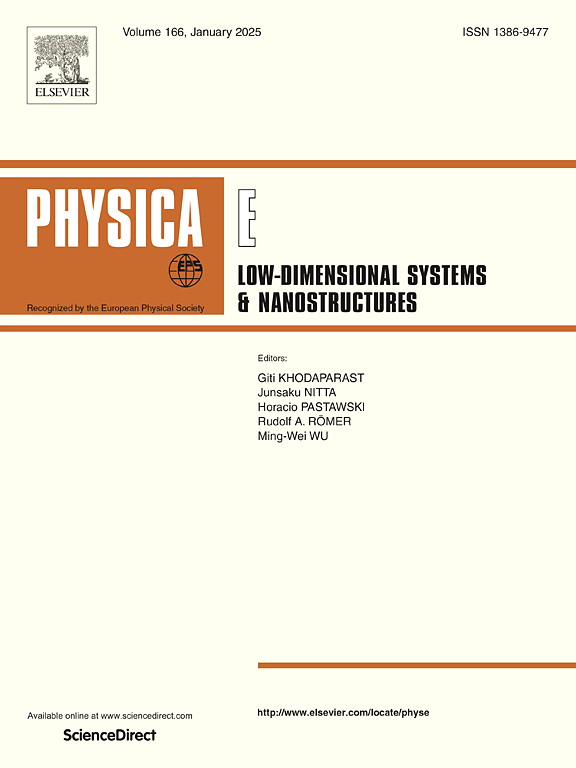The key role of anti-solvent temperature in quantum dot/perovskite core-shell nanowire array solar cells
IF 2.9
3区 物理与天体物理
Q3 NANOSCIENCE & NANOTECHNOLOGY
Physica E-low-dimensional Systems & Nanostructures
Pub Date : 2024-10-12
DOI:10.1016/j.physe.2024.116131
引用次数: 0
Abstract
Combining perovskite with infrared quantum dots to construct a core-shell nanostructure nanowire array solar cell can increase the light absorption range and enhance the light absorption and carrier transport efficiency of the solar cell. However, the preparation of a perovskite absorber layer on a nanowire array with quantum dots often presents issues such as high roughness and a large number of lattice defects, which have a negative impact on the photovoltaic performance. The anti-solvent method is a commonly used technique to improve the quality of perovskite. The temperature variation of the anti-solvent can change solubility, and influence the reaction rate and crystal formation process of perovskite, thus affecting its photovoltaic performance. In this study, the quality of perovskite in the core-shell nanostructure nanowire array was improved by controlling the temperature of the anti-solvent (toluene). Experimental results show that as the temperature of toluene increases, the photovoltaic performance is gradually improved. When the toluene temperature was maintained at 75 °C, the device exhibited significantly improved photovoltaic performance with an efficiency of 12.64 %, surpassing the efficiency obtained without any anti-solvent modification. As the temperature of the anti-solvent increases, the absorption of visible and near-infrared light spectrum by the nanowire arrays is enhanced, which promotes the efficient generation of photo-generated carriers. Furthermore, defects in the nanowire arrays gradually decrease, leading to a reduction in carrier recombination. These findings provide valuable insights for advancing core-shell nanostructure nanowire array solar cells.
量子点/过氧化物核壳纳米线阵列太阳能电池中反溶剂温度的关键作用
将透辉石与红外量子点结合起来构建核壳纳米结构纳米线阵列太阳能电池,可以增大光吸收范围,提高太阳能电池的光吸收和载流子传输效率。然而,在量子点纳米线阵列上制备过氧化物吸收层往往会出现粗糙度高、晶格缺陷多等问题,对光伏性能产生负面影响。反溶剂法是提高过氧化物质量的常用技术。反溶剂的温度变化会改变溶解度,影响过氧化物的反应速率和晶体形成过程,从而影响其光伏性能。本研究通过控制反溶剂(甲苯)的温度,提高了核壳纳米结构纳米线阵列中包晶石的质量。实验结果表明,随着甲苯温度的升高,光伏性能逐渐提高。当甲苯温度保持在 75 ℃ 时,器件的光电性能显著提高,效率达到 12.64%,超过了未进行任何反溶剂改性的效率。随着反溶剂温度的升高,纳米线阵列对可见光和近红外光谱的吸收增强,从而促进了光生载流子的高效生成。此外,纳米线阵列中的缺陷逐渐减少,从而降低了载流子的重组。这些发现为推动核壳纳米结构纳米线阵列太阳能电池的发展提供了宝贵的启示。
本文章由计算机程序翻译,如有差异,请以英文原文为准。
求助全文
约1分钟内获得全文
求助全文
来源期刊
CiteScore
7.30
自引率
6.10%
发文量
356
审稿时长
65 days
期刊介绍:
Physica E: Low-dimensional systems and nanostructures contains papers and invited review articles on the fundamental and applied aspects of physics in low-dimensional electron systems, in semiconductor heterostructures, oxide interfaces, quantum wells and superlattices, quantum wires and dots, novel quantum states of matter such as topological insulators, and Weyl semimetals.
Both theoretical and experimental contributions are invited. Topics suitable for publication in this journal include spin related phenomena, optical and transport properties, many-body effects, integer and fractional quantum Hall effects, quantum spin Hall effect, single electron effects and devices, Majorana fermions, and other novel phenomena.
Keywords:
• topological insulators/superconductors, majorana fermions, Wyel semimetals;
• quantum and neuromorphic computing/quantum information physics and devices based on low dimensional systems;
• layered superconductivity, low dimensional systems with superconducting proximity effect;
• 2D materials such as transition metal dichalcogenides;
• oxide heterostructures including ZnO, SrTiO3 etc;
• carbon nanostructures (graphene, carbon nanotubes, diamond NV center, etc.)
• quantum wells and superlattices;
• quantum Hall effect, quantum spin Hall effect, quantum anomalous Hall effect;
• optical- and phonons-related phenomena;
• magnetic-semiconductor structures;
• charge/spin-, magnon-, skyrmion-, Cooper pair- and majorana fermion- transport and tunneling;
• ultra-fast nonlinear optical phenomena;
• novel devices and applications (such as high performance sensor, solar cell, etc);
• novel growth and fabrication techniques for nanostructures

 求助内容:
求助内容: 应助结果提醒方式:
应助结果提醒方式:


